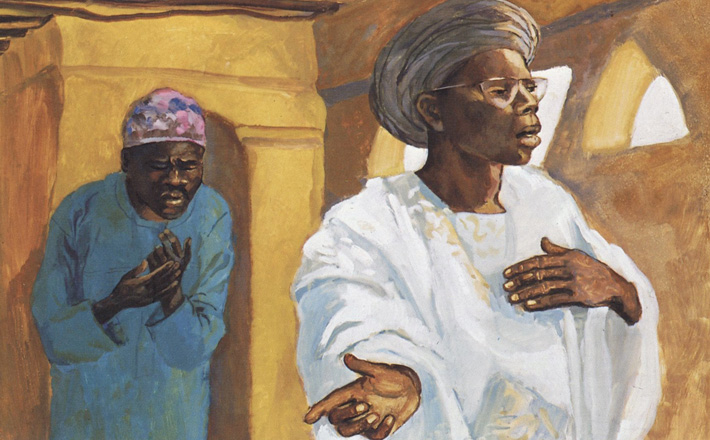Commentary on Psalm 84:1-7
Psalm 84 is classified as a pilgrimage psalm, sung as praise by those who traveled to Jerusalem to worship.
Such journeys were often beset with hardship as the traveler moved through the wilderness over great distances in order to reach Jerusalem. In verse 2 the psalmist speaks of the intense desire of these pilgrims: “my soul yearns, even faints … my heart and flesh cry out for the living God.” Creation even finds rest in the sanctuary:
3Even the sparrow finds a home,
and the swallow a nest for herself,
where she may lay her young,
at your altars, O Lord of hosts,
my King and my God.
Verses 4 and 5 tell of the blessedness (ashre) of those present in the sanctuary and those traveling toward that destination. Hope is found even in the wilderness that they traverse. The Valley of Baka, a wilderness covered by balsam trees, becomes an oasis for the pilgrims (v. 6).
The authors associated with Psalms 84 are the Korahites (sons of Korah). The Korahites are set aside for the service of the Lord in 1 Chronicles 9:19. They were placed in charge of the worship, or works of service, and keepers of the thresholds, doorkeepers of the sanctuary. This was a long held position in the sanctuary and can be dated to the time of the writing of the Book of Numbers (14:4-15). So they speak with experience about the blessedness of dwelling in the sanctuary: “Happy are those who live in your house, ever singing your praise” (Psalm 84:4, New Interpreters Version). This is highlighted in Psalm 84:10:
Better is one day in your courts
than a thousand elsewhere;
I would rather be a doorkeeper in the house of my God
than dwell in the tents of the wicked.
Thus, the work of the Korahites centered on daily service to the Lord and opening the doors for others to join in the worship.
However, there is more behind the story of the Sons of Korah. In Numbers 16-17, Korah and others lead 250 men in a revolt against Moses and Aaron. The purpose of the revolt was to bring about a change in leadership. As the leaders of the opposition stood outside of their tents the ground opened up and consumed Korah and others. Only a few would survive. The few who survived found grace by being spared and being assigned to be servants in the sanctuary. This provides a poignant meaning to the praise of Psalm 84:10. They sing from experience of how it is better to be servants in the House of the Lord, rather to be in the tents of those who oppose the Lord.
When I was a seminary student I served as a custodian in a local church. For me it was a dream job. The old church was beautiful and full of history. For the most part I was on my own. I took pride in what I did and looked for what I could do extra in maintaining the church. For a time I was truly a “doorkeeper”, since it was my job to walk throughout the church and lock up each evening. Something changed with my attitude about the job along the way. Instead of preparing the church for others, I began trying to protect the church from others. I did not want others to come in and mess up the church. I actually tried to keep people from being the church, joining together to fellowship and worship.
The doorkeeper can serve in one of two roles: 1) As a greeter, welcoming others; 2) Or as a “bouncer”, keeping others from people from entering. To act as a bouncer disregards the purpose of the church, as if one says “I know better how to do church.” It also directly challenges God who has ultimate authority over the entrance.
As doorkeepers, we are simply here to prepare a place for others. When we see ourselves as greeters, we can share in the excitement for what is prepared for those who enter. Many journey throughout the week and seek a place to “be church.” Twice in verses 4 and 5 the writer calls those who journey to the sanctuary “happy” — blessed and at peace (asher) even in the difficulties that may surround them. The church provides anticipation for those who need hope in the midst of troubles, peace in the midst of chaos, and comfort in the midst of distress. It provides renewal as the Psalmist reminds us:
7 They go from strength to strength;
the God of gods will be seen in Zion.


October 23, 2016